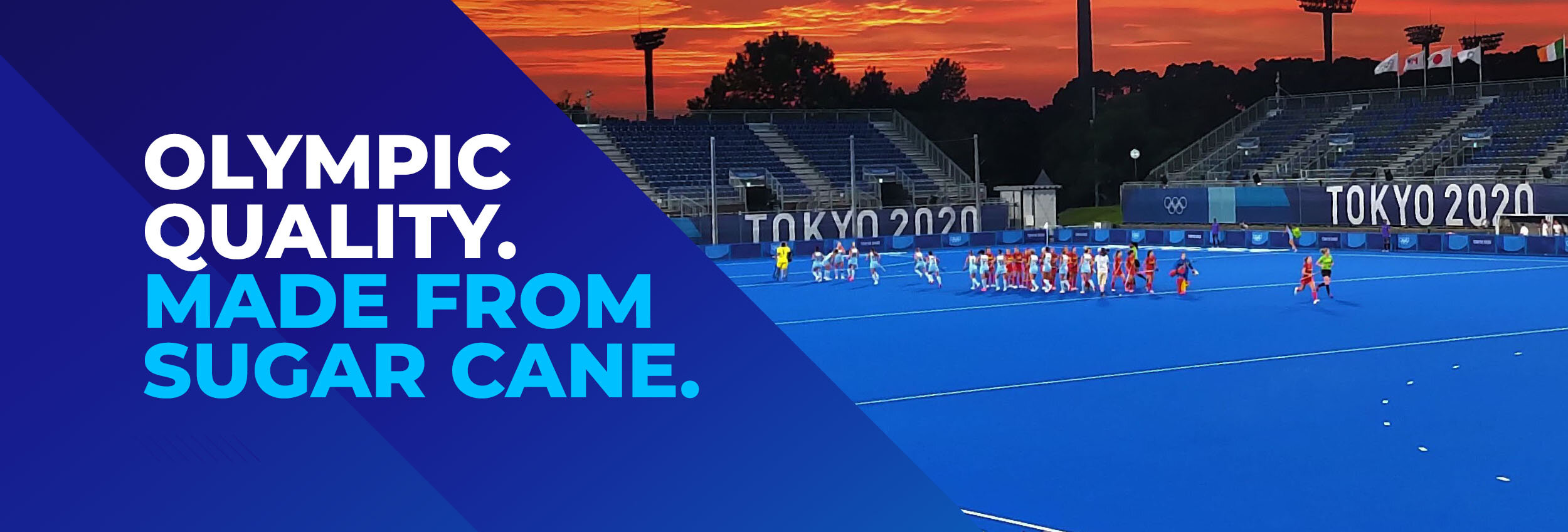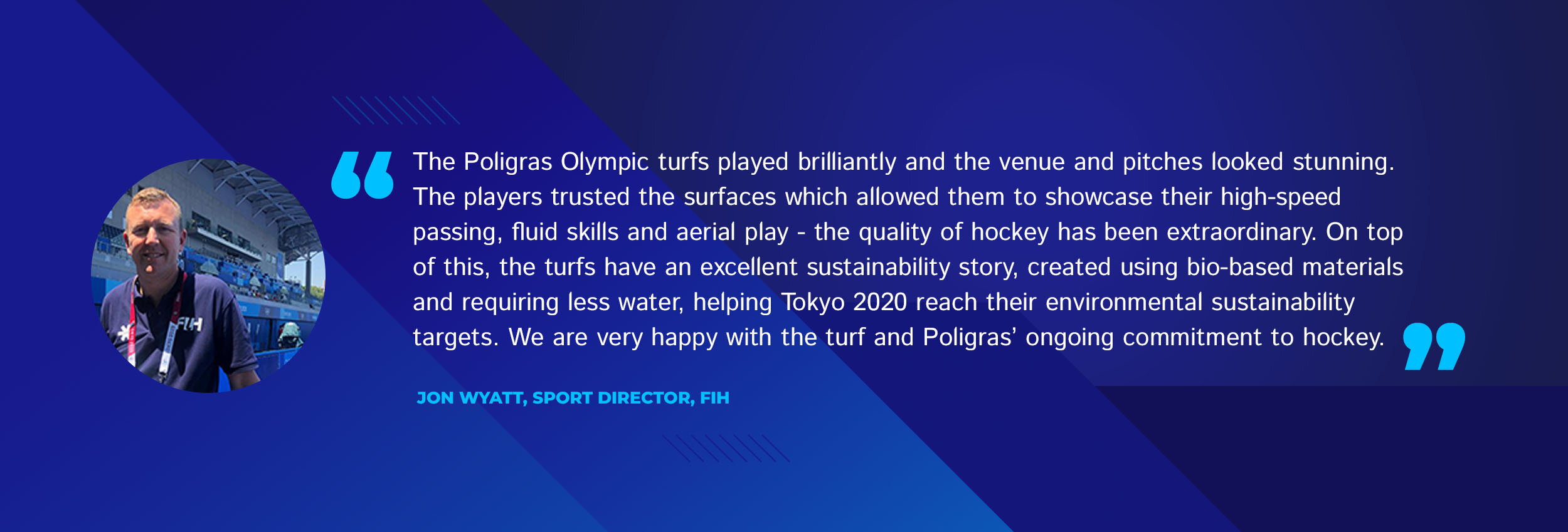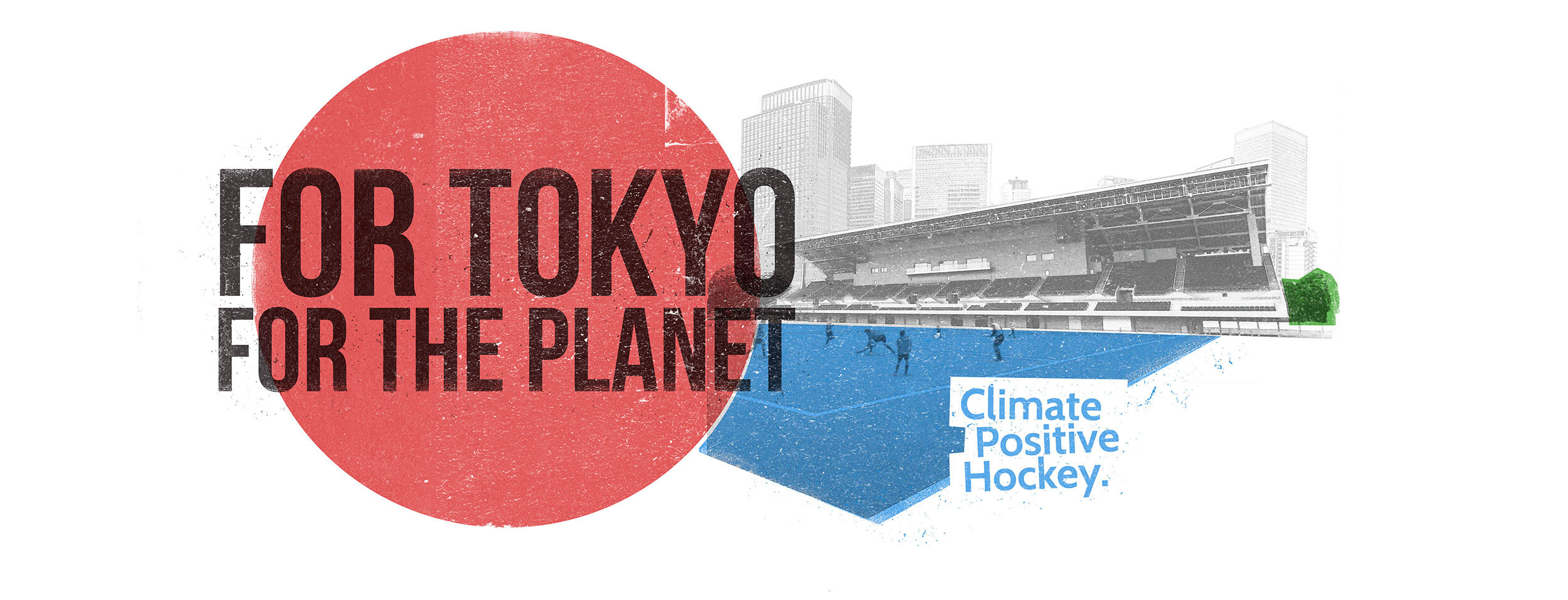Hockey wins ‘green’ at Tokyo 2020
Poligras Tokyo GT delivered performance and environmental wins in Tokyo
With Netherlands Women and Belgium Mens’ teams ultimately clinching Gold at the Tokyo Olympics, the world witnessed some of the best hockey ever played in an international competition. And these weren’t the only wins. Staged during one of the most challenging times in Olympic history, the Games were unprecedented in many ways. Poligras’ climate positive Tokyo GT (green technology) turf, which was chosen as the official hockey turf for the Games was one of the stand-out innovations.
An environmental step-change for hockey
Poligras Tokyo GT is the first hockey turf to be made from re-growable raw materials and was designed to support Tokyo’s ambitious carbon-neutral targets and the FIH’s commitment to sustainable hockey. Created using 60% renewable sugar cane, the full surface system was optimized for performance, using 39% less water than at Rio 2016. The green innovation from Poligras facilitated an environmental step-change for hockey whilst continuing to support the highest standards of elite performance.
Sustainability Best Practice for IOC and FIH
“The Poligras Olympic turfs played brilliantly and the venue and pitches looked stunning. The players trusted the surfaces which allowed them to showcase their high-speed passing, fluid skills and aerial play - the quality of hockey has been extraordinary. On top of this, the turfs have an excellent sustainability story, created using bio-based materials and requiring less water, helping Tokyo 2020 reach their environmental sustainability targets. We are very happy with the turf and Poligras’ ongoing commitment to hockey.”
– Jon Wyatt OLY, FIH Sport Director
As a result of their environmental performance, Poligras Tokyo GT climate positive turfs have been identified by the International Olympic Committee as a best practice case study for sustainability.
Case study
Challenges
The biggest challenge was finding another ingredient which would provide the same performance standards as traditional fossil fuel-based polyethylene, but without the environmental impact.
This meant looking at the whole production chain, starting with sourcing the raw ingredients.
What should it be made from? How should it be harvested?
What is the best way to manufacture it?
How do we minimise the impact of installation and transportation?
How do we keep cost-efficient and economically viable hockey?
How do we manage end of life?
Approach
We started at the beginning of the value chain with the raw ingredients. We integrated our years of industry knowledge and worked closely with technical and environmental specialists from within and outside our industry.
1. WE FOUND THE RIGHT INGREDIENT PARTNERS
We searched globally for the right partners who could meet uncompromising quality standards. With Braskem and Covestro we found the right partners.
Bio-Polyethylene
Poligras Tokyo GT turf fibres (filaments) are made from polyethylene, a non-toxic, highly recyclable plastic. I’m Green™ polyethylene is a revolutionary bioplastic from Brazilian manufacturer, Braskem. It is made from sugar cane, a renewable resource, instead of using traditional fossil fuel production processes.
Capturing CO₂ and reusing it in the value chain
All Poligras Tokyo GT hockey surfaces are installed over an elastic layer that provides key performance and player welfare benefits as part of the system.
Sport Group now offers a revolutionary new polymer cardyon® in our elastic layer binders. Produced by Covestro, one of the world’s leading polymer suppliers, cardyon® uses CO₂ captured from factory emissions as a raw material in polymer production.
This not only prevents CO₂ emissions from entering the atmosphere but brings the carbon dioxide back into the value chain.
2. WE FOLLOWED STRICT SOCIAL RESPONSIBILITY AND ETHICAL PURCHASING PRACTICES
Braskem uses sugar cane in Brazil for polyethylene production, sourcing the material from local sugar cane suppliers. Cultivation of the sugar cane is done without artificial irrigation and a high proportion of natural fertilisers (ashes and vinasse). To protect workers’ rights, Braskem has committed its ethanol suppliers to a ‘code of conduct’ through the National Commitment to Social Assistance programme.
I’m Green™ polyethylene production does not compete with sugar production, it enhances the process. Sugar cane is pressed multiple times to extract the syrup. It is only the third pressing of the sugar cane that is used for bio-polyethylene production, which is not high enough quality for sugar production.
3. WE MAXIMISED DURABILITY
No other measure reduces the impact on the climate and the environment as much as the lifetime of a product. For this reason, surfaces offered by the Sport Group brands have always been extremely durable and low maintenance, which means they support intensive use over many years.
Sport Group companies have also developed a number of intelligent technologies to help counteract the aging process caused by use, radiation, humidity, heat and extreme cold.
Strong protection against UV radiation and degradation
Entanglement technology, which is highly resistant against wear
Weather resistance to heat and freezing temperatures
Cooling technology which reduces the temperature on the pitch
Highly efficient and expert cleaning
Moisture reserve technology to support low water consumption
Incorporation of recycled and renewable materials into shockpad layers
4. WE DID NOT COMPROMISE ON PERFORMANCE OR PLAYER WELFARE
Sport Group brands have developed a reputation for their quality and performance. Focusing on sustainability is important, but not if it compromises on performance or player welfare. Our robust in-house R&D processes help ensure that Poligras Tokyo GT is not only great for the environment, but it delivers the same high performance that our clients expect.
5. WE RELOOKED AT OUR RECYCLING AND REUSE MANAGEMENT
To be able to offer to the market Green Technology, we knew it was imperative that we also provide customers with a comprehensive recycling programme at the end of the turf’s natural life. We wanted the programme to include the reusing of individual components as well as practical recycling solutions for the entire synthetic turf system.
Through FormaTurf, our own recycling business, and other recycling partners, Sport Group companies provide a recycling process for the entire turf. FormaTurf turns turf, including infill, into useful second-life objects such as fences and park benches.
6. WE DEVELOPED OUR GREEN PORTFOLIO OF PRODUCTS
After much research and testing Sport Group businesses now have Green Technology products specifically engineered for hockey:
Poligras Tokyo GT – Hockey Turf
The turf of Tokyo2020 and the first synthetic turf which features filaments made from over 60% renewable raw materials. It comes with the same performance properties as our conventional polyethylene but is made from sustainably grown sugar cane.
Polybase GT – Elastic Layer
Polybase GT is Sport Group’s Green Technology e-layer. This combines the well-known benefits of in-situ elastic layers with the environmental benefits of a recycled product and a revolutionary new technology.
The Olympic challenge was a springboard for further advances. We have further enhanced our technology and transferred it to our football turf brand, LigaTurf. The LigaTurf Cross GT is the world’s first CO₂ neutral football turf.
7. WE ENSURED WE COULD MANUFACTURE GLOBALLY
We ensured the turf can be made in our manufacturing facilities in Europe, Australia and USA. These ISO certified manufacturing bases mean short delivery distances and allow us to minimise our carbon footprint.
“With over 50 installations in 14 countries, Poligras Tokyo GT is hockey’s #1 turf. The hockey community, by choosing to be climate positive, has saved over 1,400 tonnes of CO₂… and counting.”
The Result
A new generation of highly sophisticated products and methods that combine the latest expertise from the plastics industry with the functional and environmental benefits of renewable resources and new resource-conserving technologies.
The world’s first elite level sustainable turf made from 60% sugar cane
The world’s first elastic layer incorporating CO₂ as a raw material in polymer production
A saving of 28 tonnes of CO₂ per hockey turf
Improved water efficiency for turfs. Tokyo required 2/3 less water than Sydney, 1/3 less water than London and 2/5 less water than Rio
Socially responsible material sourcing
An increased service life of the entire pitch system
Best practice recycling and refuse disposal programme for the entire pitch system







